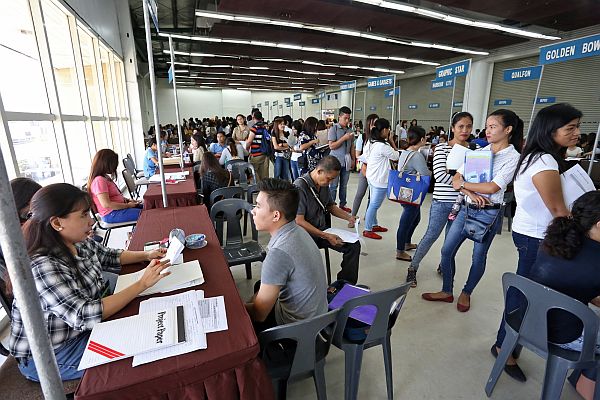
Applicants made up mostly of those from the 20 to 30-year-old age bracket try their luck at getting employed at a job fair at SM City Cebu in this May 2017 photo.
CDN FILE PHOTO
Businesses urged to be ready to handle the generation that will fill half the world’s workforce in 3 years
Businesses should learn to manage millennials especially since it is estimated that by 2020 at least half of the world’s workforce will come from the millennial generation or those who are now in their 20s and 30s.
Emma Bernad, owner and managing director of the Cebu master franchise for One Adobo Culture Cuisine, said one of the basics of managing a workforce is to understand how they think.
“Before you become a friend to someone, you have to get to know them first. The same goes with managing people. You have to know what makes them tick,” she said during the 2nd Sacred Heart School-Ateneo de Cebu business conference last Saturday.
In the Philippines, millennials comprise one-third of the country’s total population, which means they are occupying a significant part of the workforce already as well as driving the direction of the country’s economy.
According to the October 2015 Labor Force Survey, over 42 million Filipinos aged 15 years and above were part of the labor force, about 47 percent of which were millennials aged 15 to 34. This was out of the more 66 million Filipinos who were in the legal working age during that time.
Out of the more than 39 million employed Filipinos in 2015, about 45 percent were millennials. The survey stated that the largest group of employed persons belonged to the 25-to-34 age group, comprising 26.7 percent.
Meanwhile, about 80 percent of those who were unemployed during the covered period were also millennials aged 15 to 34.
Bernad described millennials, born between 1978 and 1994, as the first generation to come of age during the turn of the new millennium.
They grew up in the age of technology as well as in a child-centric family, she added.
A key to understanding the millennial generation, Bernad said, is recognizing important behaviors.
Unlike previous generations that placed value on toiling long and hard for success, millennials “want it fast and want it now.”
They also “trust their friends more than corporate mouthpieces,” “are social creatures both online and offline,” and believe that they “can make the world a better place.”
Bernad said that in order to reach them, managers must speak their language and come to them where they are.
One example would be using the kinds of communication platforms millennials widely employ, most of which are in digital form.
“Managers need to understand the complex combination of experiences and preferences that define them,” said Bernad.
She added that millennials put a premium on inspiration, responsibility and career progression.
In the workplace, these workers need to be able to relax, socialize and engage in other activities.
Bernad also stressed that commuting time and office location are among the top concerns when millennials take a new job.
Managers need to “get the deal right” and be able to think creatively about reward strategies as well as what motivates these workers.
To help the millennial workforce grow, Bernad said managers need to understand their personal and professional goals; put them on special rotational assignments more frequently; as well as challenge them to come up with new ways to streamline processes and to exercise creativity.
“Feedback, feedback, feedback is also very important,” Bernad stressed.